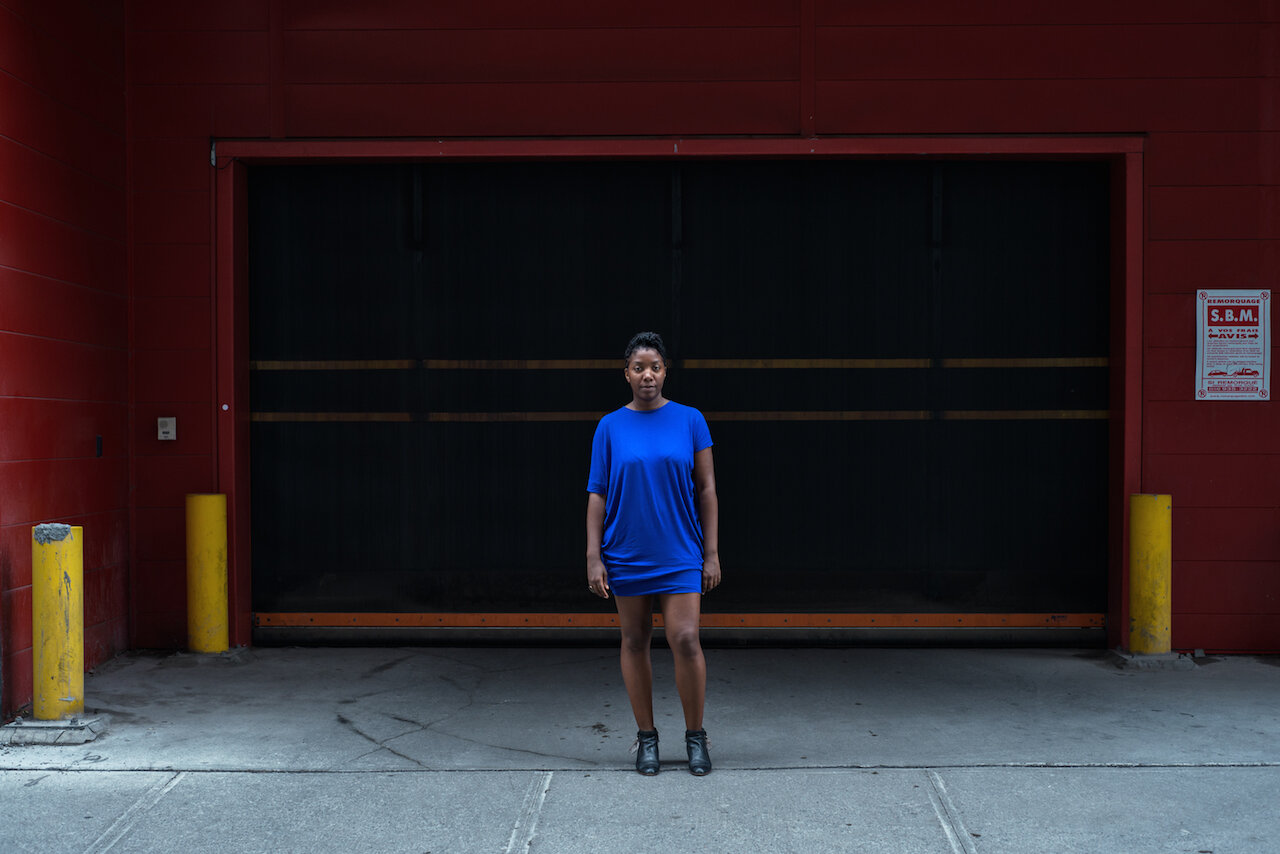“I find it outrageous to call into question my French authenticity”
“I find it outrageous to call into question my French authenticity”
Actress, film director, journalist and soon to be back on the benches of university, Amandine Gay is also a black feminist. Relocated recently to Montreal, the 30-year-old political artist summarises her native France in these terms: “country of denial.” An eloquent and smiling activist who faces challenges head on. Speak up/ Make your Way is the title of her documentary film which will be shown during Black History Month in Montreal.
You are an actress, a director, and a Black feminist. Why not just a feminist?
In France our characteristics are not addressed in traditional feminist movements which are often referred to as white feminist movements. They are mainly composed of groups of white women from the middle or the upper class who do not necessarily share our experiences and concerns. For example, for black women, the feminist struggle is inseparable from the fight against racism. But in traditional feminism, some of these issues are not addressed. On the other hand, as women and black, to focus on the intra-communal conflicts within these organisations would contribute to strengthen and perpetuate the stereotypes on black men. Indeed, when I criticise the very harsh patriarchal vision of some pan-African activists, I do not wish for white feminists to use it in order to say that black men are more misogynistic than white men. If we feel the need to find ourselves, it is also being able to carry out these intra-communal reflections, without risking the themes that we address - street harassment, for example - and without turning against the men of our own communities as if they were more sexist than the rest of society. I am a black feminist because it is as necessary to dismantle the patriarchal society as it is to put an end to white supremacy.
Historically, white feminist movements rarely address the issues of immigration and nationality. This is demonstrated particularly by Chandra Mohanty in Third World Women and the Politics of Feminism?
In the 1970s, in the French context in any case and especially in Parisian universities, we witness the birth of many movements including the Women's Liberation Movement in France (MLF). The population was still predominantly white, although many immigrants from former colonies or the Caribbean began arriving. The women, who participated in the first wave of feminist movements, were almost all white. Therefore, the subjects addressed were specific to their communities: the fight against the church, the right to abortion, etc. Other minority groups have certainly developed at the same time including the Coordination of Women in Latin America or the Coordination of Black Women, but these activists have been erased from the history of French feminism . In my film Speak up/ Make your way, I have met a few of them who are now in their fifties or sixties. They confirmed to me how in their day, the creation of specific groups for black women had appeared as a necessity against the practical and theoretical limits of communist groups and or pan-African and or feminists. So history has been repeating itself for the past forty years!
You are moving from Paris to Montreal to continue your studies in sociology and certainly you will have in your bag a copy of Speak up/ Make your way, your 90-minute documentary …
We are working to ensure that premiere takes place during Black History Month in February 2016, here in Montreal. In the meantime, I am patiently waiting and in August we will resume editing with my two cameramen and editors, Coralie and Enrico.
After five years working as an actress, especially in roles often reserved for Black women, you go behind the camera. How was this achieved?
I arrived in Paris about eight years ago in order to work in theatres. After I graduated with a bachelor in Political Sciences from Lyon, I went to Drama Conservatory in the 16th district and I readily started working. After a few months, I had portrayed the roles of a drugged woman, a prostitute, an undocumented immigrant, a cocaine user and a cannabis drug dealer. I called my agent and told him that I was tired of these castings and I wanted to obtain real roles. She then explained that she had sent my profile for all roles that corresponded to my age, but that she would only receive a reply when it is specified that the actor should be a black woman in the scene.
I was shocked but also realised: I wouldn’t ever have access to the roles that I wanted, since I could not become white. This is how I started writing short programmes for television, to promote another vision of black women. Soon enough, I reached the same conclusion. In production companies, the decision-making positions are granted to white men over 50-years-old. They are the ones who choose whether or not to fund a project. If it does not fit their vision or mirror their experiences, the project is abandoned or modified so that it no longer looks anything like the original idea. For example, a friend and I had written a satirical short program called Digital Pie. The idea was to analyse women's magazines and to compare them to real life heroines. One of the members of this group was a black woman; a lesbian and waitress. It was this role that producers were refusing and did not understand. They kept telling me I had watched too many American series and that these girls did not exist in France, simply because these producers had never met one. For me that was surreal because I'm pansexual and I managed a wine bar, this character was a mirror-image of me! When we headed to the National Cinematographic Centre (CNC) to apply for grants for this series (whose five main characters were women), we were refused on the ground that the series was potentially sexist. I then realised that there was this kind of monolithic image that women should be, particularly black women, in France, and that prior to influencing the fiction, we would have to introduce these women in a documentary. We needed to show that we existed in our physical diversity with our various lifestyles, religions, sexual orientations, etc.
But I also wish to celebrate our lives without falling into the trap of the obsession of black excellence. As we are constantly devalued in mainstream media, the speech that is given in communal media often seeks to glorify the individual’s successes, particularly when they are part of the capitalist logic. What do we do with the middle class? From those of us who do not have degrees? Those who believe that success is not limited to making lots of money? These people have a right to exist too. Getting behind the camera allows me to tell these stories with other black women coming from various backgrounds, different from mine.
Listening to you, we could conclude that France, compared with other countries, still has a segregation problem that is difficult to hide ...
France has a considerable delay. It is a country of denial. When we practice this widespread denial, it becomes difficult to solve problems that we claim not to have. In the US at least it was obvious that there was segregation. The hardest thing for France is to engage in a fight against an almost invisible enemy. The word "race" has been removed from the Constitution of 2013. Does that also eradicate racism? No, it does not change a thing. The problem is the politics of denial. To eliminate racism, we must first tackle the concept of white privilege and the taboos.
I do not have an over-zealous love for the flag. But I find it outrageous that one calls into question my French authenticity. When someone asks me where I come from, I play the fool by responding: "I come from Lyon." The question in fact is, why am I black if I am French? Nobody asks a white man or white woman where they are from. I usually revert the question back to them; after all, France has always been a land of immigration. Why should I justify my presence when the descendants of Italians, Portuguese, and Polish are not required to do so?
What is your assessment on the phenomenon of migration?
There is currently in France a reflection on migration. It is alleged that the country cannot accommodate all the impoverished of the world, which is not true. France would not be able to fully operate without migrants, especially the undocumented immigrants, who work for small compensation. There are three departments in which the state institutions have very little control: the construction sector, the catering business, childcare and elderly services. I worked in over 20 restaurants in Paris and I have never seen a single officer from the Department of Labour carrying out an audit of the premises. Yet everyone knows that Parisian kitchens are filled with undocumented migrants. I have never seen a white person do these manual chores. It is a task reserved for the Senegalese, Malians and Pakistani nationals and undocumented immigrants. Everyone knows it. When the Minister of Immigration of Quebec said that migration is not a choice but a necessity, it is a pragmatic way to perceive this society. It is a province whose population is aging, which chooses to undertake a rational migration policy. In France, we need migration but we pretend not to. It all comes back to denial.




